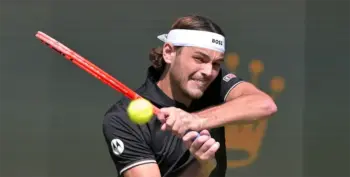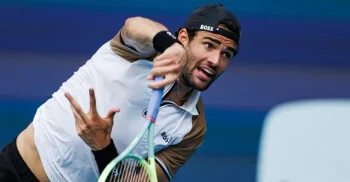Tennis betting online is obviously a favourite activity among us Tennis Nerds and we want to share some of the most important aspects of tennis betting. Below we’ll go through some of the most important parts, which includes everything from guides on how to sign up and place your first bet, to advanced betting strategies and live betting tips.

- Best Tennis Betting Sites – Our recommendations for choosing an online sportsbook.
- Live Betting Tennis – How does live betting work and where is this feature offered?
- Tennis Odds – Learn all about the odds formats betting types.
- Tennis Betting Strategy – Our best tips for creating a good strategy when betting on tennis matches.
- Tennis Betting Blog – Our thoughts… everything related to betting on tennis.
- Tennis Betting Predictions – Follow our tops picks for the upcoming matches and tournaments.
We’ll be extra active on our betting predictions picks when the four major tournaments of the Grand Slam are upon us. These events (Australian Open, French Open, US Open, and Wimbledon) provide great opportunities for betting with a lot of added odds and also promotions usually.
It’s important to choose a legal, secure and trusted betting site which work well in your area/country of residence. Our recommendations are listed below. We’ll also look at how to manage your bank roll, analyse player performance, learn about the various court surfaces, mobile betting and more.
Latest Tennis Betting Articles
Top Sportsbooks for Tennis

Popular betting site in Canada with a huge tennis odds selection! Use promo code TENNISNERD for a good welcome match bonus of up to C$180!


The online sportsbook for the serious bettor, with very high limits and a always fair odds! No bonuses available.


Big sportsbook with great odds! Accepts US and Canada players, and takes both crypto and dollars.



Accepting US bettors, claim some big welcome bonuses and get good tennis odds!



A popular betting site for US bettors, with high limits, fast withdrawals, a lot of promos and an overall great sportsbook!


US gaming site with a huge sportsbook and great odds! Also accepts crypto deposits.



Big and popular betting site with a huge tennis odds selection! Use promo code TENNISNERD for a good welcome match bonus (amount depends on your country). Available in French or English.










The online sportsbook for the serious bettor, with very high limits and a very good odds! No bonuses available.





One of the top rated sportsbooks, very user friendly and great rewards. Only accepts crypto payments.







| * Please note: All brands displayed on the list above are legal online sports betting sites, however you are responsible for determining the legality of online gambling in your jurisdiction, that you’re allowed to place bets on this specific site and that you are of legal age to bet. Please gamble responsibly and only bet what you can afford to lose. If you think you are not in control of your gambling, seek help immediately from any of these organisations: BeGambleAware or Gamcare. |
Upcoming Tennis Tournaments
TennisNerd will always keep you updated on the next upcoming tennis tournaments to bet on, wether it’s a major grand slam or a smaller event.
These are the major tournaments not to miss in 2025!
Grand Slams:
- Australian Open – Bet on Australian Open
- Wimbledon – Bet on Wimbledon
- French Open (Roland-Garros) – Bet on French Open
- US Open – Bet on US Open
ATP Masters 1000:
Overview of all the ATP Masters 1000 tournaments.
- Indian Wells (BNP Paribas Open)
- Miami Open, USA
- Monte Carlo, Monaco
- Madrid Open, Spain
- Italian Open, Rome, Italy
- Canadian Open, Montreal/Toronto, Canada
- Cincinnati Open, Ohio, USA
- Shanghai Masters, China
- Paris Masters, France
ATP 500:
- Rotterdam Open (ABN AMRO World Tennis Tournament) – Held in Rotterdam, Netherlands, usually in February.
- Rio Open – Held in Rio de Janeiro, Brazil, typically in February. It’s the only ATP500 event in South America and is played on clay.
- Dubai Tennis Championships – Held in Dubai, United Arab Emirates, usually takes place in February or March.
- Acapulco Open (Mexican Open) – Held in Acapulco, Mexico, typically in February or March. The surface was changed from clay to hard courts in 2014.
- Barcelona Open (Barcelona Open Banc Sabadell) – Held in Barcelona, Spain, usually in April. It is one of the most prestigious clay court tournaments on the tour.
- Halle Open (Gerry Weber Open) – Held in Halle, Germany, usually in June. It is a key grass-court event in the lead-up to Wimbledon.
- Queen’s Club Championships – Held in London, United Kingdom, usually in June. This grass-court event is a traditional warm-up tournament for Wimbledon.
- Hamburg European Open – Held in Hamburg, Germany, typically in July. This tournament is played on clay.
- Washington Open (Citi Open) – Held in Washington, D.C., United States, usually in July or August. It is part of the US Open Series, leading up to the US Open.
- China Open – Held in Beijing, China, usually in October. It features both men’s and women’s events.
- Tokyo Open (Rakuten Japan Open Tennis Championships) – Held in Tokyo, Japan, typically in October.
- Vienna Open (Erste Bank Open) – Held in Vienna, Austria, usually in October.
- Basel Open (Swiss Indoors) – Held in Basel, Switzerland, typically in October.
ATP 250:
- January
- February
- Dallas Open (USA)
- Open 13 Provence (France)
- Delray Beach Open (USA)
- Argentina Open
- Qatar ExxonMobil Open (Qatar)
- Mifel Tennis Open by Telcel Oppo (Location not specified)
- April
- Estoril Open (Portugal)


































